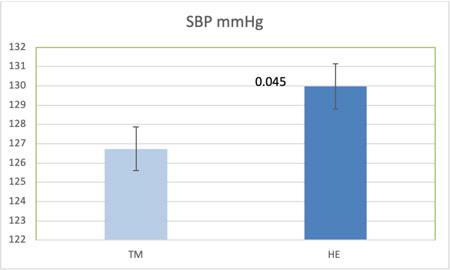February 2022
Dear Friend,
We hope you enjoy our February 2022 mini magazine. Because February is known as Heart Health Month in the USA and heart health is such a crucial topic for women, this month’s articles are pertinent:
- Links to last month’s blog written by women for women
- Journal of Preventative Cardiology publishes new findings on TM
- Relationship of love to heart health
- Q and A: In reducing heart disease, can TM save lives?
- What women say: Women’s cardiology expert gives her point of view
Blog Posts
Did you miss our last few blog posts? Below are links to the articles published in January. Feel free to share them with your friends. To see previous posts, visit our archives at tm-women.org/blog/
Children and Mental Health: What to do Now

What could be more important to a mother than her child’s well-being? We see how happy a parent feels when her child is well—and how devastated she is when her child suffers. Mental imbalances in youth, less obvious than physical ill health, take many parents by surprise—leaving them with the added misery of feelings of inadequacy and guilt on top of their deeply painful concern. When a child does self-harm or harms another, parents are often known to say that they had no idea that things were that bad.
A Woman Filmmakers Perspective on Success: An Interview with Jennifer Kachler

When I think of the profession of filmmaking, it seems glamorous and exciting and a wonderful outlet for a creative mind. But I also imagine that a successful filmmaker must be endowed with many skills. So I got in touch with Jennifer Kachler to ask her to share her experience. Jennifer Kachler is a professional filmmaker with credits as a Director, Writer, Producer and currently as Executive Producer at Shutterstock.
Articles

New Research: Further Evidence that TM Supports Heart Health
A TM/blood pressure study supported by a grant from the National Institutes of Health, National Heart, Lung, and Blood Institute was published in the December 2021 issue of the American Journal of Preventative Cardiology. The researchers found that the Transcendental Meditation technique reduces risk for cardiovascular disease and potential co-morbidities (such as COVID) in a high-risk group: Black adults with high normal blood pressure.
Hypertension contributes to severe illness and death from COVID as well as heart attack and stroke. All adults with high blood pressure would benefit from naturally lowering their BP through the Transcendental Meditation program.
This is the first published clinical trial studying the long-term effects of stress reduction for at-risk individuals with high normal blood pressure (pre-hypertension).
There was a significantly greater systolic blood pressure reduction in the group who learned TM compared to the control group of participants who didn’t learn TM but instead had health education.

Findings suggest that the practice of the TM technique in patients with high normal blood pressure can contribute to the prevention of hypertension, cardiovascular disease, and related health disparities as seen in high-risk Black populations.

Happy Heart, Healthy Heart
Several months back we reported on the Peta Axelsson Zimba Memorial Scholarship, established in loving memory of Peta who dreamed of empowering women and girls in her beloved Zimbabwe through Transcendental Meditation.
Love is good for the heart. Any kind of love for anything—even love for your pet goldfish.
The hormones associated with love flood our body, affecting the nervous system—and, tangentially, our heart—in a positive way. Our warm and fuzzy feelings ramp up our parasympathetic nervous system, helping us to relax. Relaxation reduces stress, anxiety and depression, all of which are risk factors for heart disease.
Feelings of love also settle the sympathetic nervous system, which is responsible for the fight or flight reaction. When we’re relaxed, our blood vessels dilate a bit so blood pressure can be reduced. These are some of the reasons, physiologically speaking, that women who have healthy, loving relationships have better heart health.
In women, the nourishing tendency is natural, innate. As women, we tangibly support the heart health of those we love—because receiving social support seems to improve their immune system and lower their risk of inflammation, which can be detrimental to the heart.
So loving and loving relationships are not just emotionally fulfilling but are truly important to our physical health. What can we do to expand our capacity to love and to create happy relationships?
First—give someone a good hug. Hugging a friend or family member boosts levels of oxytocin, the feel-good hormone that helps us relax. Studies have shown that hugs can buffer us against heart disease, possibly by lowering blood pressure and heart rates.
Then contact a local certified TM teacher to schedule instruction in TM. Published studies show that the Transcendental Meditation technique reduces family problems and improves personal and work relationships. It relaxes you, reducing stress and anxiety—which not only can cause heart disease directly, but which also inhibit the flow of love. It increases inner happiness and self-esteem, giving you a platform for sharing, listening and loving.
If you’ve already learned TM, keep regular in the practice. And recommend that your friends and family learn—relationships thrive most when everyone has the ability to flow with love.
Q&A
Question: How do cardiologists and heart disease researchers know that the Transcendental Meditation technique can actually be life-saving?
Answer: Heart disease was already the number one cause of death for women in the United States before COVID. During COVID women’s hearts are under even worse stress.
Most women do not understand enough about heart disease to know how to avoid it. Many women are not alert to the ramifications of stress, fatigue, anxiety, smoking and an unhealthy diet. Yet in a patient’s life the onset of heart disease is taking place over many years prior to her first diagnosis of cardiovascular disease—years filled with unhealthy choices, behaviors and emotions. Studies show that 80 percent of women between the ages of 40-60 have at least one heart disease risk factor that can be controlled.
The TM technique reduces risk factors of heart disease and its recurrence. TM reduces the three major risk factors for heart disease: high blood pressure, high cholesterol and diabetes. The TM practice is also a powerful tool for reducing chronic anxiety and stress, both of which strain the cardiovascular system. The TM technique has also been found to be successful in curbing smoking and substance abuse, reducing these additional common risk factors.
One study—conducted at the University of Wisconsin and presented at a conference of the American Heart Association—showed that deaths, heart attacks, and strokes were cut by nearly half for at-risk patients who practiced the TM technique.
What Women Say

World renowned cardiologist and author Dr. Suzanne Steinbaum was formerly Director of cardiology departments for women in three major New York City hospitals. Watch this two-minute video to hear her opinion on the benefits of the TM technique to women’s heart health, including:
“TM has actually been shown to reduce strokes and heart attacks along with high blood pressure. It is a very effective treatment tool.”
Editor’s note: We’d love to hear your comments on the benefits you’ve received from the TM practice. And, with your permission, we’ll publish them here for other women to enjoy. Send your comment to info@tm-women.org




























